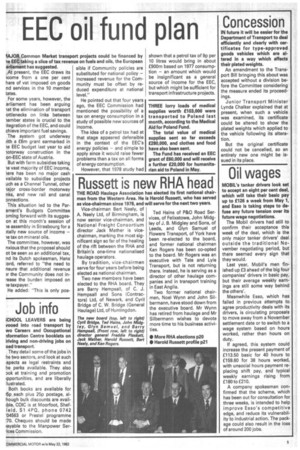EEC oil fund plan
Page 5

If you've noticed an error in this article please click here to report it so we can fix it.
IAJOR Common Market transport projects could be financed by hie EEC taking a slice of tax revenue on fuels and oils, the European arliament has suggested.
At present, the EEC draws its Icome from a one per cent hare of vat imposed on goods nd services in the 10 member tate& For some years, however, the arliament has been arguing let the elimination of transport ottlenecks on links between lember states is crucial to the itegration of the EEC, and could chieve important fuel savings. The system got underway iith a £6m grant earmarked in le EEC budget last year to aid lotorway construction in the on-EEC state of Austria.
But with farm subsidies taking le vast majority of EEC income, lere has been no major cash vailable to subsidise projects uch as a Channel Tunnel, other iajor cross-border motorway nks, and new rail and canal onnections.
This situation led to the Parament's Budgets Committee oming forward with its suggeson at this month's session of le assembly in Strasbourg for a Aally new source of income — le tax on mineral oils.
The committee, however, was nxious that the proposal should at be seen as an additional tax, nd its Dutch spokesman, Hans lord, referred to "the need to nsure that additional revenue )r the Community does not inrease the burden imposed on le taxpayer."
He added: "This is only pos sible if Community policies are substituted for national policy — increased revenue for the Community must be offset by reduced expenditure at national level."
He pointed out that four years ago, the EEC Commission had mentioned the possibility of a tax on energy consumption in a study of possible new sources of income.
The idea of a petrol tax had at that stage appeared defensible in the context of the EEC's energy policies — and simple to apply since it would raise fewer problems than a tax on all forms of energy consumption.
However, that 1978 study had shown that a petrol tax of 9p per 10 litres would bring in about £900m based on 1977 consumption — an amount which would be insignificant as a general source of income for the EEC, but which might be sufficient for transport infrastructure projects.






























































































